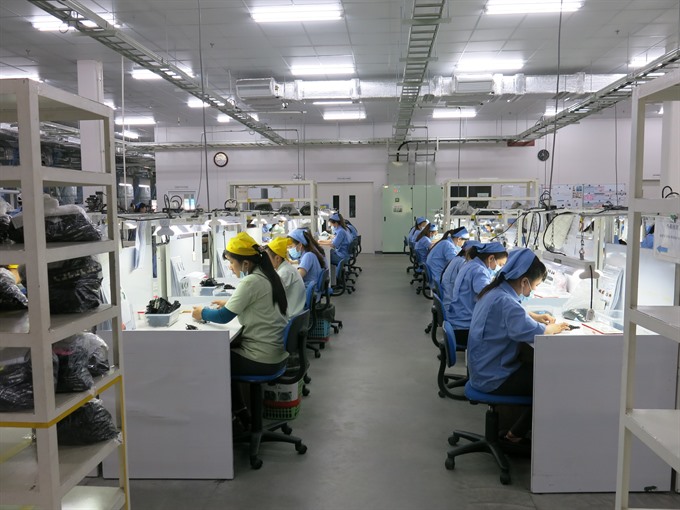 Economy
Economy

As one of the fastest growing provinces in the key southern economic zone, Bình Dương is among the hottest investment destinations in the country.
 |
| Workers inside TPR Việt Nam Limited Company at the VSIP II Industrial Park in Bình Dương Province, which is among the locomotives driving the southern key economic zone.—VNA/VNS Photo Hải Âu |
BÌNH DƯƠNG – As one of the fastest growing provinces in the key southern economic zone, Bình Dương is among the hottest investment destinations in the country.
It was chosen to host the 2018 Horasis Asia Meeting on November 25-26.
On November 27, participants who attended the meeting were taken on a tour to see for themselves what the province has done and will do to support investors, according to Mai Hùng Dũng, deputy chairman of its People’s Committee.
He said Bình Dương has become a “golden land” for business and opens its doors wide to welcome investors.
The province is located in the southern key economic zone, the most vibrant business region in the country and which is growing at 1.5 times the country’s average.
Just two decades ago Bình Dương was an agricultural area with modest infrastructure. But now it is the third largest FDI destination in the country behind only HCM City and Hà Nội.
It is home to more than 3,400 foreign-invested projects from 64 countries and territories and trades with 200 countries and territories.
Dũng told participants at the meeting that the province gives priority to investment in high-tech industries, supporting industries, IT, precision engineering, trading, and services.
“I believe the combination of technological and financial advantages, international trading network and business skills of the investors and the strengths of Bình Dương will bring mutual benefit.”
Frank-Jürgen Richter, chairman and founder of the Zurich-based independent think tank Horasis, told Việt Nam News that the areas which “stuck out” and drew the most attention from participants at this year’s meeting were the ICT sector and anything linked to the fourth industrial revolution, including automotive manufacturing.
More than 50 Japanese investors and a large number of Indians came to Bình Dương seeking opportunities in IT, he said.
Education was another sector that participants had their eyes on, he said.
Some universities were looking to enter into partnerships for setting up a research lab or a small campus, he said.
“I think the future is here and our investors and participants are delighted to be here.”
According to Richter, there were some concrete results such as the signing of an MOU between Becamex IDC Corporation and Nitol Niloy Group from Bangladesh.
A session on Investment Opportunities was attended by provincial leaders who listed projects seeking investment and replied to investors’ questions on a case-by-case basis, he said.
He said the next step now would be to follow up on the discussions, and capitalise on the enthusiasm of the participants, and turn them into action and get people into working mode to make the investments happen.
Bình Dương already has very impressive infrastructure, but it also needs “soft infrastructure,” he said.
“We have to get the people, we have to get the education, attract foreigners, offer schools for expats, and bring more lifestyle options here because in an investment development zone you need all of the services.
“If we call this is smart city it should not only focus on investment but also lifestyle.”
In 2016 the province began to work on the Bình Dương Smart City Scheme. The province has partnered with the Dutch city of Eindhoven to work towards sustainable socio-economic development based on the Triple Helix model of collaboration, which involves a partnership between research institutions, businesses and the government.
The detailed plans for building the smart city are available online in a strategic programme called Bình Dương Navigator 2021.
The people-centric programme lists the following tasks among others: strengthening workers’ skills and education; expanding R&D activities and building a start-up eco-system; attracting more FDI in high-tech manufacturing; improving the transport and ICT infrastructure, business climate and people’s living conditions; and enhancing the province’s international co-operation.
The province aims to become a modern tier 1 city before 2020 and join the Intelligent Community Forum (ICF) before 2021, which will allow it to link up with a network of 160 smart provinces and cities around the world.
Besides building the smart city, the province is also developing a smart region based on ICF standards.
Bình Dương New City will be the centre of the smart region and house the most important urban areas, research and educational institutions, and industrial zones. —VNS




